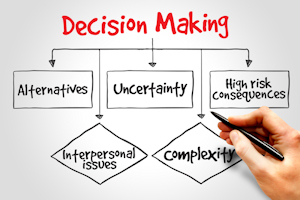I tend to look at someone’s decisions or the actions they’ve taken and wonder “What was the world they were looking at that would have had those actions and those decision seem like the exact right thing to do?”
Now I know that not everyone thinks like me and thank goodness that’s true but for me in a business or project management context, asking that question of myself can become quite important. You’ll see the results of my pondering in numerous writings here on the blog as it has come up in many different contexts.
Think about portfolio project management (or project portfolio management if that’s your preference) for a moment. There are many different portfolio analysis tools on the market and all of them deliver empirical results on which project should take a higher priority in order to deliver better value to the organization. If you follow the processes that come with such products, you end up with valuable introspection on how your business valuates projects and what drives the business. That alone would be a worthwhile exercise but when these values are applied to projects the list of what projects should be activated and which not becomes reasonably clear.
Portfolio software salespeople produce beautiful charts showing graphically how this will improve the bottom line to the organization just by selecting the right projects.
And yet, there is resistance to implementing such a system.
Why? What world did the executives who protested perceive that would have them say “Portfolio Analysis? That’s a terrible idea!” Well, ok they never say that. Instead there is a litany of odd and non-sequitur responses that result in the initiative dying on the table.
Yet, when you think about the people in those roles you might find, for example, that their compensation is tied to their projects being a success (as I once discovered) and that having their project not be priority 1 would result in an actual loss of personal income. I’d expect that anyone facing such a decision could be expected to vote in favor of what’s good for their own family.
Another counter-intuitive situation seems to be more and more common in the last couple of years.
For quite some time it was apparent to most people that the idea of writing their own corporate timesheet or project management system was a terrible idea. The cost of creating new software is always more than the sheer development cost. I created a white paper comparing this some time ago. Buy it or Write it? can still be downloaded and read on the TimeControl.com website. It shows that creating new software includes doing your own design, writing the code, then documenting it, making help for it, providing ongoing technical support and ongoingly updating it which isn’t optional as all the operating systems and underlying architecture the system was written for is changing all the time. The overall costs made it prohibitive to write your own product.
When you think about this idea separate from the calculations, it passes a reality check. If you write an enterprise tool for your own use, you are amortizing that development and total cost of ownership over one client; you. If you’re a commercial software developer like my firm HMS is, then you are amortizing the total cost of development and support over hundreds of thousands of users and hundreds or thousands of clients as is the case with our TimeControl timesheet product.
So why then, more recently, would this idea of writing an enterprise product here in the office, return as a supposedly great idea? What world are the people who are speaking to me about this seeing that makes this a sensible choice?
One possible answer came to me just a few days ago. Today’s development world looks nothing like it did years ago. There is a massive outsourcing community where the costs of development are much lower than developing locally. It’s true that you must devote more money and time to more senior local personnel to design, document, project manage and communicate the ideas that the business needs, but the actual developers are less expensive and it may still be attractive.
Even more significantly, if I’m the leader of an internal offshore development team then my day is probably largely spent investigating opportunities for my offshore developers to work on. I’d be in sales mode all the time, even if I’m part of an internal team.
Suddenly the argument I’d make to a business who is looking for enterprise project management or timesheet software that a commercial off the shelf package will be more economical and do so much more for you than writing something yourself may fall on deaf ears.
I might find that I’m unknowingly speaking to the very person who is managing a large team of offshore developers all of whom are eager to create such an application themselves.
So, I’ve had to dust off my Buy it or Write it white paper to do some editing. It was overdue anyway. These days, the options are more likely to be Subscribe to it, Buy it or Write it yourself.
The basic premise is the same though.
Is it your core business practice to be the publisher of an enterprise project management tool?
If not, you’re spending time and money creating something that will only ever have one client.
Are you sure that’s the right decision? Consider all your options before deciding.



